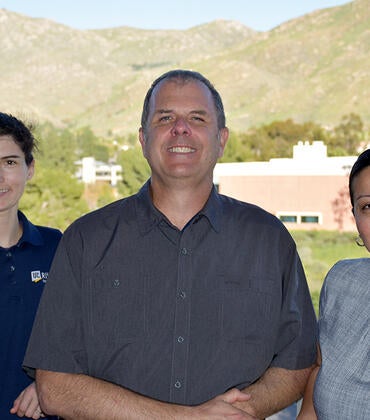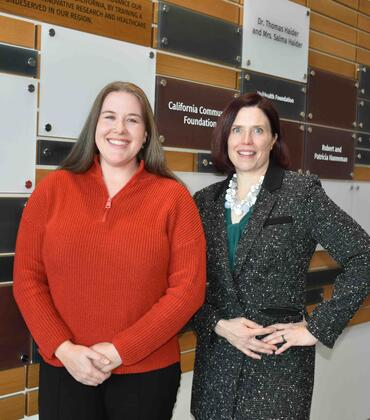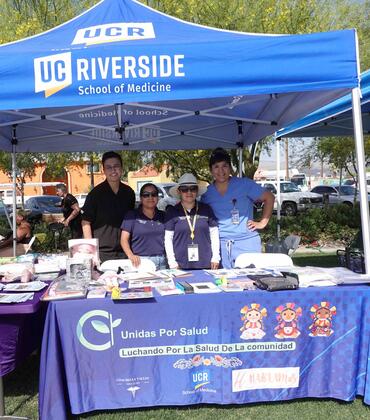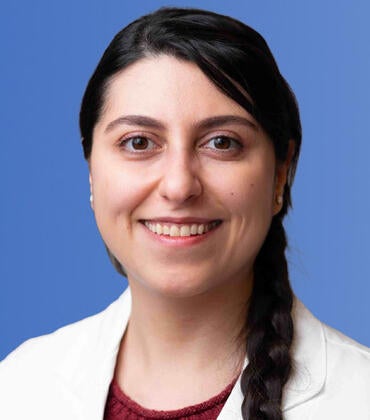
When Keziyah Yisrael, biomedical sciences class of 2024 began working on PhD research focused on the Salton Sea, she had no idea that the project would become an enduring passion and the likely basis for her career.
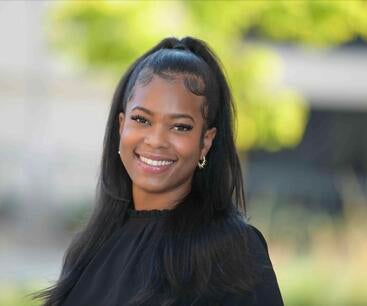
Yisrael majored in microbiology at the University of the Sciences in Philadelphia with the goal of studying infectious diseases. Interested in both the research and clinical side of medicine, she enrolled in UCR’s biomedical sciences graduate program for its focus on combining the two. During the first year of her PhD program, she took medical school courses alongside future physicians. “It was nice to learn the clinical aspect of things but also be side by side with these clinicians to help foster translatable research, and getting them involved in research to understand the behind the scenes,” Yisrael recalled.
Her interests in infections and immunity soon led her to join the lab of David Lo, MD, PhD, a distinguished professor of biomedical sciences and director of the Bridging Regional Ecology, Aerosolized Toxins, and Health Effects (BREATHE) Center at the UCR School of Medicine. Yisrael began working with Lo on environmental triggers for asthma around the Salton Sea and never looked back--to the point that she now plans to continue with the project in her postdoctoral research, too. “It's so funny because people ask, ‘You're just going to stay in your lab as a postdoc?’” said Yisrael. “I'm like, ‘You do not understand the tie that I have to this project alone.’”
Since joining Lo’s asthma research project, Yisrael has both witnessed and contributed to its rapid progress. The research sought to identify potential environmental triggers leading to complaints of asthma-like symptoms among Salton Sea community residents. Located in southern Riverside and northern Imperial County, the body of water is one of the largest inland seas in the world but has been drying up for years as a result of water diversion and global warming.
Following Lo’s finding that dust from the Salton Sea was contributing to inflammation among residents, Yisrael’s primary thesis project investigated components of the dust that could be causing health issues. Her research identified a bacterial toxin contaminating the dust, leading to lung inflammation and asthma symptoms when adults and children in the area inhale it.
“At the very beginning, you had this community complaining of asthma-like symptoms, but you had no idea of what was causing it,” Yisrael said, adding that the lab tested water, dust, and other potential environmental causes and experimented with their exposure to animals. “From all those years of just figuring out what sort of inflammation [the dust] causes, now we have an actual reason as to why it's leading to the inflammation in this population,” she continued. “From this broad question to actually having to pinpoint an answer has been a great journey for me.”
Now, Yisrael looks forward to continuing her work in Lo’s lab to further the project and seek solutions for the community. For her postdoctoral research, Yisrael plans to begin testing potential therapeutics to find one that can treat the inflammatory response present among Salton Sea community members. She will also apply for grants for clinical studies, moving beyond animal research to begin studying inflammatory markers in people. Ultimately, she hopes to progress to human clinical trials of possible treatments, including forming a company to develop and create the medication. Yisrael expects to be involved with that company for the foreseeable future--potentially her entire career. “I don't know where my relationship ends with the Salton Sea community,” she said.
Yisrael appreciated Lo’s support throughout her time in the PhD program and his guidance in achieving her goals. “He's been an amazing mentor,” she said. “When I joined his lab, it was very much, ‘What do you want to do when you graduate? How are we going to get you there?’”
Lo said that he and Yisrael planned for her future in biotech, and that the Salton Sea asthma project, while originally unrelated, naturally developed to encompass that goal. Lo praised Yisrael’s leadership in coordinating the project, including integrating discussions among labs across campus and presenting research in community settings.
“Her work also illustrates another point, which is that the notion of high impact does not have to be limited to publishing in elite journals,” Lo added. “It can be at least as important, perhaps even more, to do research that can directly improve the health of our community.”
Working for, and with, the community
As far as Yisrael knows, their team is the only one working to address these specific issues in the Salton Sea. Other researchers are examining environmental issues like the sea’s microbiome and ecology, but the health effects have not been a main focus area.
“It’s just so shocking to me how no one else is studying this,” Yisrael said. “While I have a handle on this project, I'm not willing to just leave it here. And I want to see that translate into the field and how we can actually help the people of the community.”
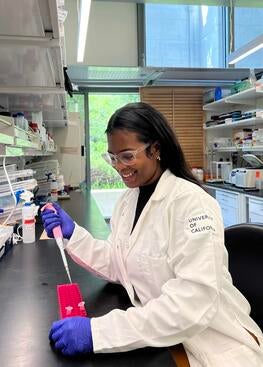
The issue is even worse, Yisrael said, because it’s not only adults suffering with health issues, but children. Their asthma sometimes necessitates that they limit their time outdoors or even remain inside all day. “It's sad to see from a research perspective, but also just as a person,” said Yisrael. “I think it’s imperative that, as researchers, we help our community in any way that we can.”
Beyond working to find solutions to community health issues, Yisrael’s team makes an effort to actively connect with the community. This engagement with residents, she explained, demonstrates to community members that their issues are valid and deserve to be addressed. “We aren't just going to that community and taking from that community,” said Yisrael. “We try to really disseminate our data and our findings…to help them understand what's actually going on and to give them some answers after all this time of health issues.”
Yisrael added that it’s her job as a scientist to remind community members that their concerns are heard. “We understand their issues, and we're here to figure out exactly what's going on and how we can help them, regardless of their income, regardless of their race, regardless of their accessibility to hospitals and health care,” she said.
Talking with community members also helps ensure that the team addresses the most relevant research questions. Recently, the team hosted a community forum at the UCR Palm Desert Center to share their findings. Yisrael said that audience members were engaged and interested in understanding the science, and also shared suggestions for future research. One person pulled Yisrael aside to ask if the team had examined the effects of Salton Sea environmental factors on pregnancy. “I thought that was a really, really important impact,” said Yisrael, adding that she hopes to address it in her future research.
The timing of the research is also essential, Yisrael said, because the community has recently been finding its voice after decades of health issues. Beyond speaking to researchers directly, Yisrael said community members have reached out to political representatives to bring more attention to the area. “In conjunction with our research, there's a bunch of other research going on in the Salton Sea to try to address these [environmental] issues, but it's all been because the community has stood up for themselves and complained enough or to the right people that people have begun to take interest and were able to get funding to do research in the area,” she said. “So this is all community led research.”
While Yisrael’s research is critical for helping people living near the Salton Sea, she said it has broader implications as well. Yisrael explained that the health issues in the region stem from the drying of the lake, which in turn results from global warming. Similar issues are also occurring in other parts of the world.
“I think that the data that we're gathering here and the studies that we're doing on the Salton Sea area may help in more of a larger global picture as well once we have scientists who begin to study these other areas,” Yisrael said. “So while my project is dear to me because it directly helps these minority people in this area who've been suffering for decades with no answers, it also is very important as more of a global issue because global warming is honestly not something that we can prevent.”
Championing diversity and access to education
During her time at UCR, Yisrael has also worked to promote another issue close to her heart: diversity. In fact, UCR’s commitment to diversity was part of her attraction to the school. “Being a first-generation African American graduate student, it was important for wherever I went to feel comfortable and to be in an environment that I felt that I could actually succeed and progress in,” Yisrael said. “Knowing that I was going to a university that valued that was very important for me to feel safe so far from my family.”
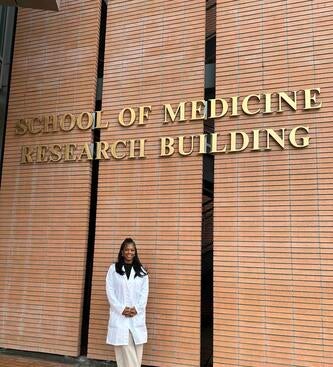
Yisrael said she was glad to see that UCR lived up to its value of diversity, and she worked to help promote it even more by participating in committees to recruit diverse faculty members and working on strategies to help retain them.
She also helped create a seminar program to introduce students in nearby high schools to university life. Yisrael noted in talking to community members and other students from minority backgrounds that many weren’t aware of funding opportunities for higher education. “I think that a lot of universities and a lot of people who do have this information are not really disseminating it or making sure that it's getting to the right group of people,” Yisrael said.
After pursuing a science education for nearly a decade and meeting only a handful of other Black women, Yisrael realized the importance of pushing for diversity. “I love to help out however I can whenever it comes to increasing and maintaining diversity,” she said.
As Yisrael continues at UCR for her postdoc, she said she plans to stay involved with diversity initiatives both on and off campus, including fostering connections with minority students as they consider undergraduate and graduate school.
Particularly as a woman and a Black individual herself, Yisrael wants others to know that they can enter science and succeed just like she did. “It's not rare or unheard of,” she said. “It is rewarding, and we have just as much say and knowledge and everything else as any other person or man in the field,” she added. “As long as you're strong and confident, you can do anything.”
